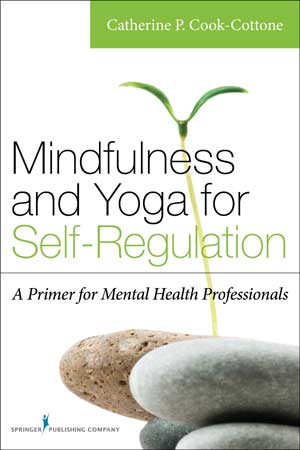With a recent surge in empirical support for mind–body approaches, many counselors are hungry for tools to assist them in learning to effectively use mindfulness and yoga for self-care and in clinical practice. Catherine P. Cook-Cottone offers just such a tool with her well-researched book, Mindfulness and Yoga for Self-Regulation.
The book is organized into four carefully developed sections. The author begins by weaving a conceptual framework from current literature, anecdotal experience, and both Hindu and Buddhist teachings. The primary focus is on self-regulation and dysregulation in the context of mental health as well as mindfulness and yogic philosophy. For example, the author describes how her conceptualization of embodied self-regulation differs from more traditional approaches. She identifies the risks associated with dysregulation and the corresponding mental health issues. She distills the major tenets guiding mindfulness and yogic philosophy into twelve principles termed “embodied practices” for living, and discusses the application of these practices in clinical settings.
In part two, “The Mindful Self,” Cook-Cottone elaborates on the clinical relevance of the philosophy of mindfulness. She provides information about formal and informal mindfulness practice in the context of counselor self-care and applications in clinical practice. The structure of part three mirrors part two, with an emphasis on yoga. The author presents the foundation of yogic philosophy and guidelines and tips for formal and informal practice, as well as information about creating a practice, including finding yoga teachers, different styles of yoga and possible risks involved. In the fourth and final part of the book, topics such as treatment protocols, contradictions and self-care are addressed. Cook-Cottone concludes the book by addressing mindful self-care as a self-regulating practice.
Although there is a wealth of information presented in this primer, there are also some areas that may be ripe for further exploration. For instance, there is little information provided about the use of specific yoga asanas (poses). However, to address this, the author provides a rationale for this choice and points the reader to excellent resources for learning poses and sequences (e.g., teachers, books, Web sites). Also, though cultural context is provided throughout the text, cultural sensitivity is not the focus of this book. It would be useful for future publications to offer a more in depth look at multicultural issues related to integrating mindfulness and yoga in clinical practice. Though it is not possible to cover everything in just one book, there are many areas that are thoughtfully addressed in this primer.
The in-depth attention that is given to each topic makes this book a robust resource for counselors. The author provides a host of strategies and resources to use both during and between sessions, including tips, cautions, worksheets, meditation scripts, assessment tools, and suggested open-ended questions for intervention and assessment. For example, when describing the philosophy of mindfulness, the author not only outlines concepts of the Eightfold Path, but also provides links to clinical practice, including questions for clients such as, “What does the phrase ‘pain is inevitable, suffering is optional’ mean to you?” She also includes case studies and instructional stories to help the reader understand key points and how these concepts translate into clinical practice.
Cook-Cottone suggests that utilizing mindfulness and yoga in clinical practice requires counselor commitment to personal practice, acceptance of clients on their unique path, and development of mindfulness and yoga-informed clinical knowledge and skills. This book is a rich resource to guide counselors toward that end.
Cook-Cottone, C. P. (2015). Mindfulness and yoga for self-regulation: A primer for mental health professionals. New York, NY: Springer.
Reviewed by: Jamie E. Crockett, NCC, Wake Forest University
The Professional Counselor

